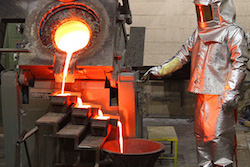The head of a Canadian mining company has admitted to interacting with Mexico criminal groups in order to facilitate mining operations, illustrating a common regional dynamic that is rarely discussed publicly.
On April 9, in an interview with Canada’s Business News Network, Rob McEwen — the president and chairman of Toronto-based McEwen Mining Inc. — said his company has a “good relationship” with drug cartels in Mexico’s Sinaloa state, reported The Associated Press.
Discussing how violence and criminal groups affect his company’s work in Mexico, McEwen said, “If we want to go explore somewhere you ask [the cartels] and they tell you, ‘No.’ But then they’ll say ‘Come back,’ in a couple of weeks; ‘We’ve finished what we’re doing.’”
The interview took place two days after the theft of 900 kilos of gold-bearing concentrate, which contained around 7,000 ounces of gold, from the company’s El Gallo 1 mine in the Sinaloa municipality of Mocorito. The value of the stolen gold has been estimated at around $8.4 million.
According to McEwen, eight heavily armed thieves entered the mining installation in a “very well planned” heist. The robbers overpowered two employees, taking their keys to access the complex, and used at least two vehicles to remove the gold from the site.
Local authorities suspect the involvement of current or former workers in the robbery, especially given that the vault door had been left open overnight and the robbery was not immediately reported to police.
Following the theft, Manuel Reyes — president of the Mexican Association of Mining, Metallurgical, and Geological Engineers (AIMMGM) — echoed McEwen’s statements, acknowledging that, “We ask the mafia for permission, the organized crime groups, and we are able to [operate]. Things get resolved because there are negotiations by the companies.”
InSight Crime Analysis
Although McEwen did not admit to paying extortion fees to criminal groups, his acknowledgement that his company coordinates with organized crime is unusual. While major companies throughout Latin America pay extortion fees in order to protect their employees and operations, few readily admit to doing so. Nonetheless, evidence of such behavior has been witnessed in Colombia, where mining operations and oil companies are major targets for extortion carried out by illegal armed groups.
In Mexico, the extortion of mining companies has become a common practice as criminal groups diversify their revenue streams, resulting in massive losses for the country’s mining industry. According to The Wall Street Journal, there has been a recent spike in security problems for mining companies and their employees in Mexico in the form of kidnappings and extortion, which the Canadian Chamber of Commerce said was making Mexico less attractive for investors.
SEE ALSO: Coverage of Mining
While McEwen did not name a specific cartel, the El Gallo 1 mine is located in the Sinaloa Cartel’s stronghold, suggesting that the group may have had a hand in carrying out the theft, and that the Sinaloa Cartel may also be the group McEwen was referring to when he said his company had “a good relationship” with local criminal groups.
Indeed, while groups like the Zetas and the Knights Templar are more commonly associated with extorting the mining sector, there is no reason to think the Sinaloa Cartel has not also sought to profit from Mexico’s lucrative mining industry.

